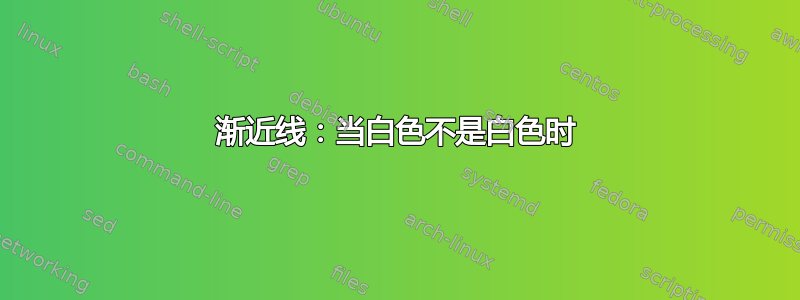
我正在尝试使用 Asymptote (3D PDF) 显示一个白色的 3D 球,但它总是变成灰色:

import graph3;
import solids;
defaultrender.merge=true;
size(10cm,0);
currentprojection=orthographic(-Z);
//currentlight=Headlamp;
//currentlight=light(-10,1,1);
//currentlight=White;
currentlight=Viewport;
draw(unitsphere,rgb(1,1,1));
我知道这是灯光问题,我也尝试调整它的设置(源代码中注释掉的几行是我的一些尝试),但我绝不设法让白色成为白色。如果我理解正确的话,我的灯光需要更白的漫射成分,但我不明白如何实现。而且文档也不太清楚……
这将是分子模型的一部分,我将对其进行如下渲染:

答案1
正如g.kov建议的那样,您可能最好使用material而不是照明。特别是,环境光往往相当微妙;您最好使用emissivepen,它实际上会将那种颜色添加到整个球体,而不管照明如何。
import three;
defaultrender.merge=true;
size(10cm,0);
currentprojection=orthographic(-Z);
draw(unitsphere, surfacepen=material(diffusepen=gray(0.5), emissivepen=gray(0.6), specularpen=black) );
结果:

答案2
这对您可能来说太白了,但您可以根据需要减少emissivepen和。我附上了代码和参数从到的diffusepen更改,步骤为。emissivepen1.00.50.1
import settings;
outformat="eps";
// interactiveView=false;
// batchView=false;
import three;
size(200);
//currentprojection=orthographic(5,4,3);
//defaultrender=render(compression=Zero,merge=true);
currentlight.background=blue;
material White=material(diffusepen=gray(1.0),emissivepen=gray(1.0));
draw(unitsphere,White);

答案3
nolight使白色变为白色!
nolight使黄色变为黄色!
// http://asymptote.ualberta.ca/
import three;
size(8cm,0);
draw(Label("$x$",EndPoint),O--1.5X,Arrow3);
draw(Label("$y$",EndPoint),O--1.5Y,Arrow3);
draw(Label("$z$",EndPoint),O--1.3Z,Arrow3);
//pen p=yellow+opacity(.9)+5pt;
pen p=white;
//draw(unitsphere,p);
draw(unitsphere,p,nolight);





